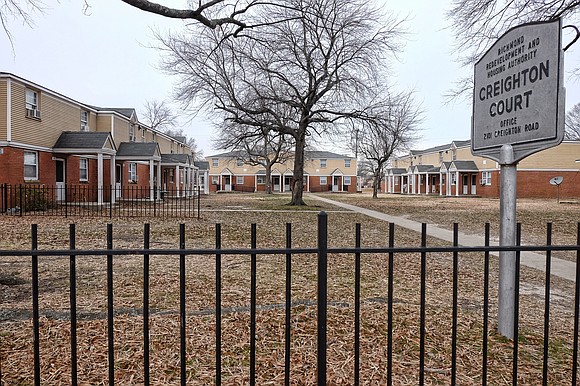Get out
Court-ordered RRHA evictions raising alarms in Creighton Court
Jeremy M. Lazarus | 10/25/2019, 6 a.m.

The Richmond Redevelopment and Housing Authority has quietly stopped leasing apartments in the Creighton Court public housing community in the East End that is earmarked for future redevelopment.
The shutdown began after Damon E. Duncan took over as RRHA’s executive director in the spring, and it has set off alarms over the warehousing of key affordable housing for Richmond’s poorest families. According to RRHA, Mr. Duncan’s decision has left 94 of the 504 units at Creighton Court vacant.
The housing complex located off Nine Mile Road, at the city’s border with Henrico County, soon will have more vacant apartments. As many as 105 families, many from Creighton Court, are to move by the end of the year, RRHA noted, into the first two phases of Armstrong Renaissance, replacement residences being built at the former site of Armstrong High School in the 1600 block of North 31st Street. That work began in October 2018.
Mr. Duncan’s decision to halt leasing at Creighton Court became public this week as RRHA began stepping up its efforts to collect overdue rent from Creighton tenants who are more than 90 days behind in payments. Mr. Duncan strategy is separate from the planned redevelopment of Creighton Court.
While plans have been in the works for five years, he stated that the Creighton on-site redevelopment is still a work in progress and “will be undertaken as a collaborative effort between RRHA, our residents and our development partner, The Community Builders,” a Boston-based nonprofit that is engaged in the Armstrong Renaissance project.
Community organizer Omari Al-Qadaffi, who first raised the alarm over the number of families RRHA was taking to court in a Facebook post on Monday, is not convinced the moves are disconnected.
In his post, he included a copy of the Creighton Court Mixed-Income Redevelopment that RRHA and The Community Builders created and reviewed with tenants last year.
That proposal calls for creation of 788 apartments and 88 for-sale units on the Creighton grounds, replacing many of the units now there. However, it remains unclear when that plan would move forward, given that the financing to make it happen is still a long way from being put in place.
Mr. Al-Qadaffi stated that the failure to lease apartments at Creighton Court increases the backlog of more than 2,000 families already on RRHA’s waiting list for public housing, “Creighton Court has not signed a new lease since June,” he wrote.
In a theme others picked up, he stated, “It is unconscionable for Richmond’s public housing authority to leave units empty to facilitate their demolition and redevelopment plan,” he continued. RRHA is “funded and legally bound to provide low-income housing to our most vulnerable residents. Instead, residents are being targeted for displacement.”
While apparently higher than usual for Creighton, the number of eviction filings is not unusual for RRHA, which is a major player in Richmond’s eviction story, according to the RVA Eviction Lab at Virginia Commonwealth University.
A study by the lab shows that RRHA filed for 2,210 evictions in 2017 and for 1,512 evictions in 2018 for all of its properties. The actions resulted in 886 judgments against tenants in 2017 and 1,009 judgements in 2018. The lab is still awaiting RRHA data on how many people ultimately left public housing.







